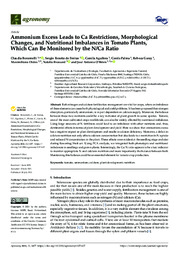Ammonium excess leads to Ca restrictions, morphological changes, and nutritional imbalances in tomato plants, which can be monitored by the N/Ca ratio.
Ammonium excess leads to Ca restrictions, morphological changes, and nutritional imbalances in tomato plants, which can be monitored by the N/Ca ratio.
Author(s): BONOMELLI, C.; FREITAS, S. T. de; AGUILERA, C.; PALMA, C.; GARAY, R.; DIDES, M.; BROSSARD, N.; O'BRIEN, J. A.
Summary: Both nitrogen and calcium fertilization management are vital for crops, where an imbalance of these elements can cause both physiological and yield problems. It has been proposed that nitrogen absorption, particularly ammonium, is in part dependent on calcium supply. Moreover, the balance between these two nutrients could be a key indicator of plant growth in some species. Tomato, one of the most cultivated crops worldwide, can also be widely affected by nutritional imbalance. Using large amounts of N fertilizers could lead to an imbalance with other nutrients and, thus, detrimental effects in terms of plant development and yield. Here we show that ammonium excess has a negative impact on plant development and results in calcium deficiency. Moreover, a deficit in calcium nutrition not only affects calcium concentration but also leads to a restriction in N uptake and reduced N concentration in the plant. These effects were evident at the seedling stage and also during flowering/fruit set. Using PCA analysis, we integrated both phenotypic and nutritional imbalances in seedlings and grown plants. Interestingly, the Ca/N ratio appears to be a key indicator to monitor appropriate N and calcium nutrition and more importantly the balance between both. Maintaining this balance could be an essential element for tomato crop production.
Publication year: 2021
Types of publication: Journal article
Unit: Embrapa Semi-arid Region
Observation
Some of Embrapa's publications are published as ePub files. To read them, use or download one of the following free software options to your computer or mobile device. Android: Google Play Books; IOS: iBooks; Windows and Linux: Calibre.
Access other publications
Access the Agricultural Research Database (BDPA) to consult Embrapa's full library collection and records.
Visit Embrapa Bookstore to purchase books and other publications sold by Embrapa.

